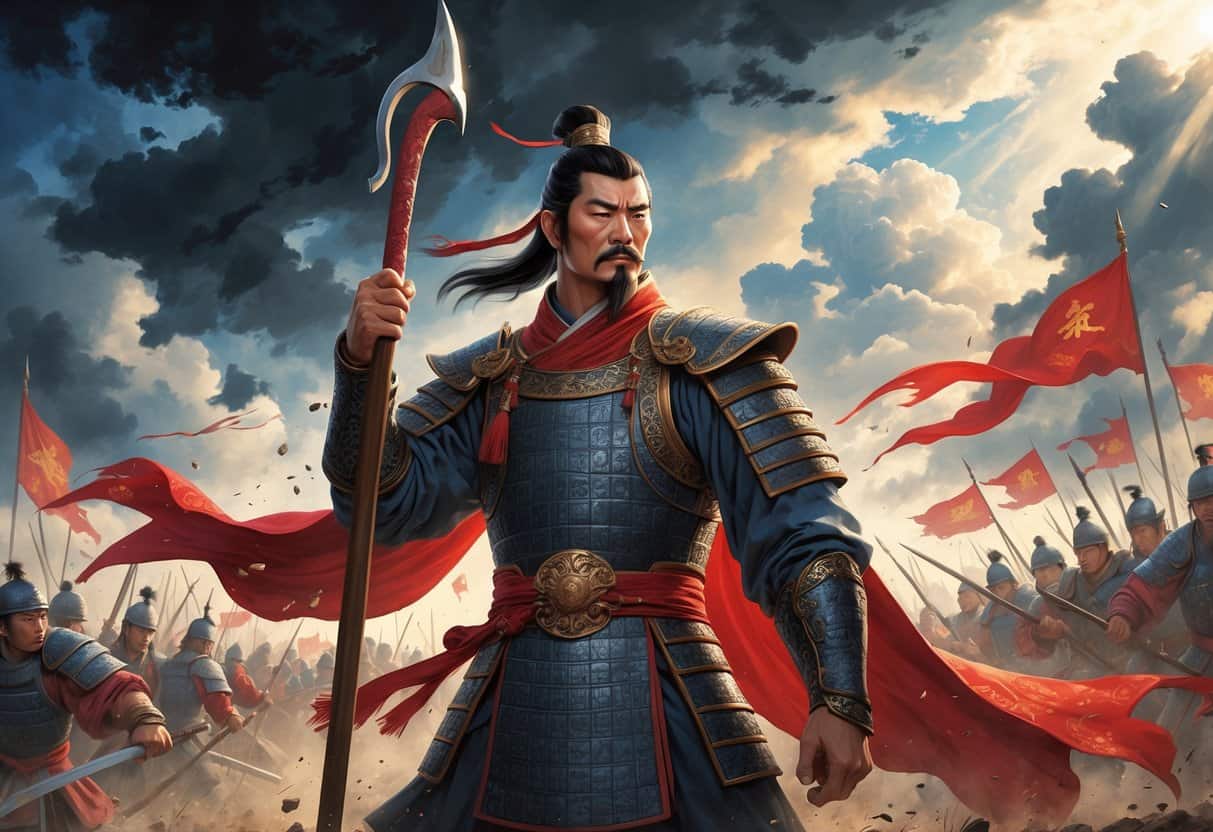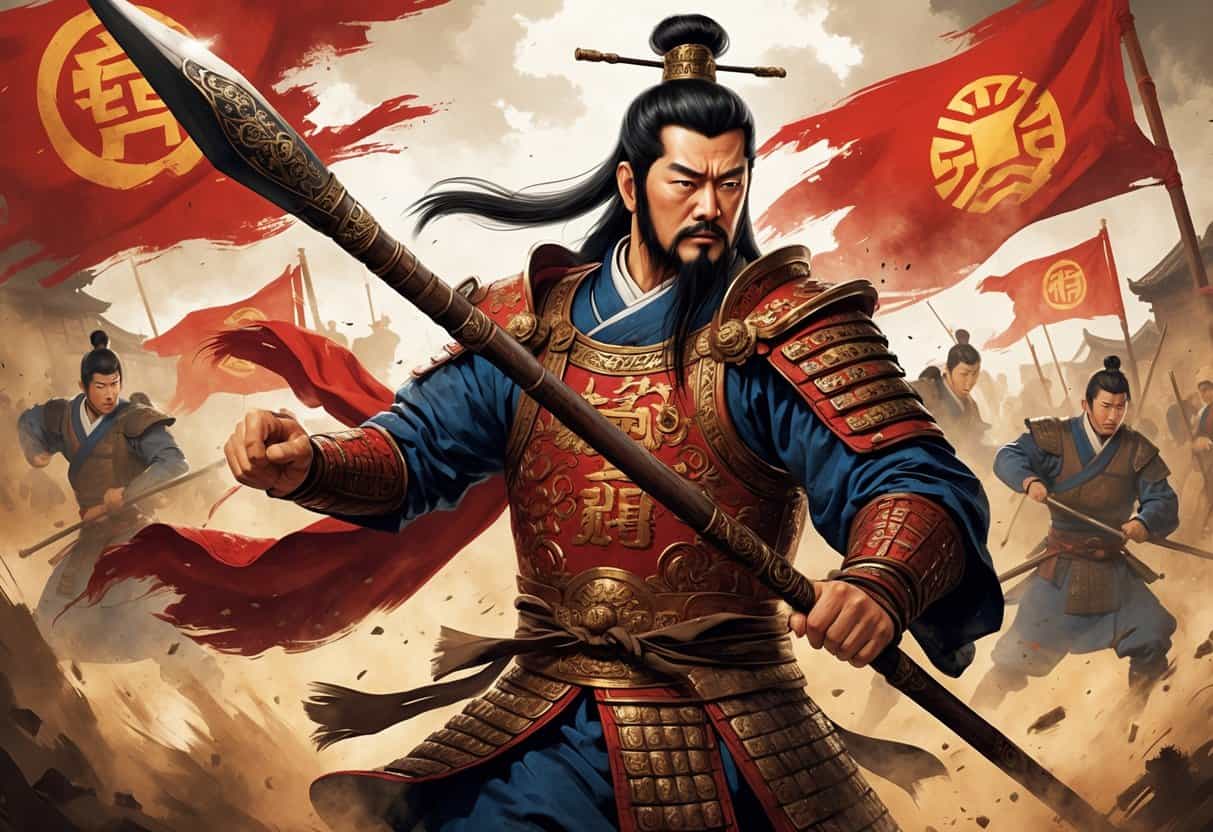Zhang Fei was a fierce general during China’s late Han Dynasty. His strength and bravery made him a key figure in many battles.

His story is tangled with betrayal and conflict, which eventually led to his downfall. If you want to grasp the messy realities of loyalty and power back then, Zhang Fei’s life is a good place to start.
This guide breaks down his life, his most famous fights, and the challenges he faced from those closest to him.
Zhang Fei’s legacy lives on in stories, dramas, and history books. His fierce spirit still matters, and you’ll see why as you read.
Key Takeways
- Zhang Fei played a crucial role in major battles during his time.
- Betrayal deeply affected his military career and personal life.
- His story remains influential in both history and culture.
Zhang Fei’s Legendary Life and Historical Background

Zhang Fei’s life is a mix of loyalty, fierce battles, and strong bonds. He had close ties with Liu Bei and Guan Yu, and played a big role during the chaotic Three Kingdoms period.
Origins and Early Life
Zhang Fei came from a humble background in present-day Shanxi Province. He was known for his bravery and strength from a young age.
Before becoming a general, he worked as a soldier and had a reputation for being quick-tempered but highly skilled in combat. His early years shaped his bold, straightforward personality.
These traits made him a valuable ally to powerful figures later on.
Allegiances and Brotherhood
Zhang Fei’s bond with Liu Bei and Guan Yu is legendary. The three formed a sworn brotherhood, promising loyalty and support to each other.
This pact was more than friendship—it was the glue behind their fight against rival warlords. Zhang Fei defended his brothers fiercely, often battling enemies to protect their lands and honor.
Role in the Age of the Three Kingdoms
As the Han Dynasty broke apart, Zhang Fei fought to capture and defend regions like Jingzhou and Yizhou for Shu-Han. His courage in battle helped secure these areas and keep Liu Bei’s claim to power alive.
Sometimes he was reckless, but his presence on the battlefield was vital. His leadership shaped the future of Shu-Han in this wild chapter of China’s history.
Fierce Battles and Military Tactics
Zhang Fei’s fighting style shaped key battles. His military skills influenced power struggles, and his victories and tactics reveal why he was both feared and respected.
Major Campaigns and Victories
Zhang Fei played important roles in battles against rival warlords like Cao Cao and the forces of Eastern Wu. His stand at the Battle of Changban, where he protected Liu Bei’s retreat, is still talked about.
He fought at the Battle of Red Cliffs—a turning point against Cao Cao’s massive army. His moves slowed the enemy, buying time for his allies.
His defense tactics often involved holding narrow passes or using terrain to split the enemy. This helped Liu Bei’s forces survive some pretty rough spots.
Reputation as a Commander
Zhang Fei’s reputation was built on raw strength and fearless leadership. He led from the front, charging enemies directly.
Soldiers admired his bravery, but he was also known for his temper, which sometimes caused problems with allies. Still, commanders like Liu Bei trusted him with key positions.
His reputation spread across rival states like Wei and Wu. They feared his unpredictable attacks and relentless spirit.
Iconic Strategies in Warfare
Zhang Fei used psychology and surprise in battle. One famous trick was making a huge racket—loud noises and displays of force—to confuse enemies and make his army seem bigger.
He focused on controlling key spots like mountain passes or bridges. That forced battles where his tough, angry troops had the advantage.
He also mixed direct assaults with waiting for reinforcements, showing patience despite his fiery personality. These strategies balanced offense and defense.
Impact on Civil Wars and Power Struggles
His actions influenced major power struggles during the late Han Dynasty. In battles with states like Wei and Eastern Wu, Zhang Fei’s efforts shaped shifting alliances.
His loyalty to Liu Bei stood in contrast to generals like Lu Bu, who were infamous for betrayal. Zhang Fei’s steadfastness was crucial in resisting Cao Cao’s ambitions.
He was there at key battles, helping protect the imperial palace’s interests during unstable times. While revenge and conflict marked the era, Zhang Fei’s commitment helped Liu Bei’s faction survive.
Betrayals, Downfall, and Legacy
Zhang Fei’s life was shaped by loyalty and, in the end, a shocking betrayal. His death shook Shu-Han and led to big shifts in power.
Notable Betrayals and Usurpation
Zhang Fei was betrayed by his own subordinates. Two of his trusted officers, Zhang Da and Fan Qiang, killed him while Shu-Han was still fighting rival kingdoms.
The betrayal was partly because Zhang Fei was harsh and quick-tempered, which alienated some generals. Their actions weakened Shu-Han’s defenses at a critical time.
After his death, power in Shu-Han became unstable. Internal strife like this shows how even strong leaders can be brought down by those closest to them.
Death and Immediate Aftermath
Zhang Fei died just before Liu Bei launched a campaign against Eastern Wu to avenge Guan Yu. Losing Zhang Fei was a huge blow—Liu Bei lost a powerful ally and brother-in-arms.
Without Zhang Fei’s fighting skills, Shu-Han forces struggled to stay strong. Liu Bei ended up losing several battles and had to retreat.
The betrayal led to more turmoil inside Shu-Han. Rivals took advantage, and the kingdom grew weaker against Wei and Wu. This chaos opened the door for the rise of Western Jin centuries later.
Zhang Fei’s Enduring Legacy
Zhang Fei’s legacy is all about loyalty and courage. In stories and dramas, he’s a symbol of bravery—though sometimes mixed with anger and harshness.
He’s remembered with Guan Yu and Liu Bei as part of the famous brotherhood. His fierce spirit inspires those who value loyalty above all.
Even after Shu-Han’s fall, Zhang Fei’s story lived on in poems, plays, and history books. His life is a warning about betrayal, but also a lesson in standing firm for friends and causes.
Zhang Fei in Culture, Drama, and Historical Records
Zhang Fei shows up in stories and plays across centuries. Sometimes he’s the fierce warrior; other times, a more layered character shaped by loyalty and bravery.
Depictions in Romance of the Three Kingdoms
In Romance of the Three Kingdoms, Zhang Fei stands out as bold, sometimes hot-headed, but fiercely loyal to his brothers. His strength in battle and loud threats make him memorable.
His relationship with Zhuge Liang is worth noting—Zhuge Liang’s calm strategy often balances out Zhang Fei’s force and impatience. That contrast highlights both his loyalty and his reckless side.
Representation in Chinese Drama and Early Plays
Zhang Fei was a popular figure in zaju and yuan plays during the Yuan dynasty. These early dramas focused on his bravery and loyalty, using his character to explore martial skill and filial piety.
During the Ming and Qing dynasties, his portrayal became more complex. Sometimes he’s rough but with a heart of gold. Early Chinese drama played up his loud personality for entertainment, while still emphasizing Confucian values like loyalty.
Modern Translations and Academic Interpretations
Modern scholars like Stephen H. West and Wilt L. Idema have translated and studied Zhang Fei’s stories to show his cultural significance. They dig into how he symbolizes both warrior strength and human flaws.
Translations in Dutch and other languages have spread Zhang Fei’s story beyond China, even reaching Taiwan and the Ryukyu Islands. Academic work often contrasts historical records with the novel’s dramatized version to give a fuller picture.
Influence on Chinese and East Asian Culture
Zhang Fei’s image still stands tall in Chinese culture—and honestly, well beyond that. You’ll spot his story popping up in festivals, operas, and all sorts of popular media throughout East Asia.
He’s especially present in regions once tied together by the old Indian Ocean trade, like the Nagas and Ryukyu. There’s something about his legacy that just clings to the big ideas: honor, loyalty, strength.
Even now, in Taiwan and other corners of East Asia, you see Zhang Fei showing up in dramas and stories. The respect for the warrior’s role in both history and myth doesn’t seem to fade anytime soon.